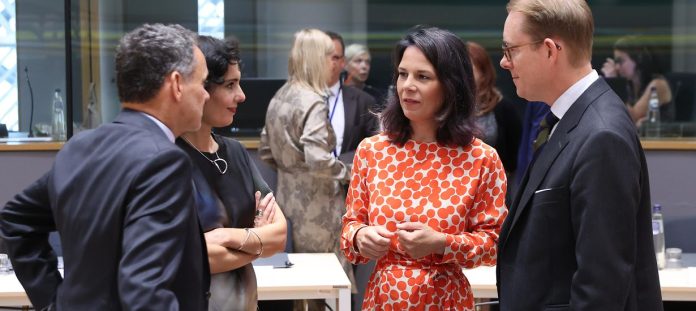EU foreign ministers have gathered in Luxembourg to discuss developments in the Middle East and Ukraine. At the beginning of the meeting, the foreign ministers issued a joint statement regarding the Israeli attacks on UNIFIL.
EU foreign policy chief Josep Borrell will chair a two-day meeting of the Foreign Affairs Council, which will be attended by Ukrainian Foreign Minister Andrii Sybiha via videoconference for an informal discussion.
The ministers are then expected to exchange views “on military support to Ukraine by the EU and its member states, especially on air defence, artillery and ammunition, as well as on the extension of the mandate of the EU Military Assistance Mission to Ukraine (EUMAM Ukraine).”
Ministers will also discuss the latest developments in Lebanon and Gaza, as well as other global issues, including the situation in Georgia and Moldova, the Horn of Africa and Venezuela.
British Foreign Secretary David Lammy will also attend the meeting and hold an informal lunchtime talk.
Britain and Europe share “the same concerns”
Borrell told reporters ahead of the meeting that Britain and Europe are neighbours and partners who share “the same concerns.” Borrell said:
“We share the same concern about the violence in the Middle East. We both call for an immediate cease-fire in Lebanon and Gaza, on that we are strongly together calling for a cease-fire in the Middle East war.”
David Lammy, for his part, said: “The security of the UK and Europe is indivisible,” and emphasised the importance “that the UK and Europe remain firm and clear” in the face of regional and global challenges.
Borrell recalled that 27 EU member states agreed to support UNIFIL (UN Interim Force in Lebanon) and asked Israel to stop attacks on the UN peacekeeping mission.
In a statement issued late Sunday, Borrell said on behalf of the EU:
“We urgently await explanations and a thorough investigation from the Israeli authorities about the attacks against UNIFIL, which plays a fundamental role in the stability of South Lebanon.”
The statement also called on all parties to ensure the safety and security of UNIFIL personnel. On Sunday, UNIFIL said two Israeli tanks destroyed the gate of a UN peacekeeping facility in Ramya, in southern Lebanon.
Earlier on Friday, Israeli troops shelled a UNIFIL observation post at its headquarters in Naqoura, southern Lebanon, wounding two peacekeepers from the Sri Lankan contingent.
“It is completely unacceptable attacking United Nations troops,” Borrell said, stressing that there was no point in blaming UN Secretary-General António Guterres because he was not the one who decides whether UNIFIL should continue to operate in the region. He explained:
“It is the Security Council who takes this kind of decision.”
Famine is used as a war arm in the Middle East
He also called on EU countries to take a united stance on the situation in the Middle East, saying:
“It is quite evident that we should be against Israelis attacks against UNIFIL, especially because our soldiers are there… So I would appreciate if member states could reach an agreement on that quicker. Famine is being used as a war arm,” the EU foreign policy chief said and recalled that the number of humanitarian aid trucks entering Gaza was at its “lowest level since the beginning of the war.”
UNIFIL is an international mission established by the UN Security Council in 1978 to restore peace and security in southern Lebanon, near the border with Israel. The mission consists of 10,000 peacekeepers from 50 countries, including 16 EU countries.
Since September 23, Israel has carried out massive airstrikes across Lebanon against Hezbollah targets, killing at least 1,488 people, injuring 4,297 and displacing more than 1.34 million.
The air campaign was an escalation after a year of cross-border hostilities between Israel and Hezbollah since the start of the offensive on the Gaza Strip, in which Israel killed more than 42,200 people, most of them women and children, following a Hamas attack last year.
Despite international warnings that the Middle East is on the brink of regional war because of Israel’s relentless attacks on Gaza and Lebanon, it widened the conflict on October 1 by launching an invasion of southern Lebanon.
